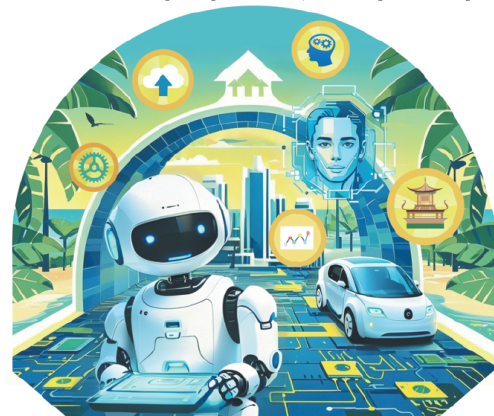Does AI pose a threat to sustainable development?


Editor's note: The 2025 World Economic Forum, being held in Davos from Monday to Friday under the theme "Collaboration for the Intelligent Age", is expected to foster a spirit of cooperation and optimism in the digital age in a more sustainable way, despite the different positions of the participants and global uncertainties. Three experts share their views on the issue with China Daily.
Projected estimates indicate that advanced artificial intelligence (AI) systems will necessitate over $1 trillion in investments for cloud and enterprise data center infrastructure within the next five years.
The AI infrastructure includes servers equipped with graphics processing units (GPUs) or custom accelerators, dedicated networks, storage solutions and specialized facilities, which are all factors that demand significant capital investment. Therefore, evaluating the scale, potential returns and environmental impact of AI's rapid development and application is essential.
The rise of AI will significantly impact the energy sector, as AI systems require a substantial amount of energy. According to the International Energy Agency, a large percentage of energy consumption in data centers is dedicated to computing and cooling, each accounting for about 40 percent.
This situation is expected to become even more complicated with the increasing use of AI systems, as their greater computing power leads to higher power density. Dense clusters of high-performance chips generate significantly more heat than standard central processing units (CPUs), requiring much more energy for cooling these systems to prevent overheating.
GPUs are specifically designed for AI and heavy computing tasks. They need to run continuously and thus consume significantly more power than standard processors. A typical CPU or server chip, in general, consumes between 75 watts and 200 watts, comparable to a light bulb's power consumption. In contrast, modern NVIDIA GPUs designed for AI applications can consume five to 10 times more power, resulting in a similar increase in heat generation.
As a result, the power consumption of a typical hyper-scale data center is expected to rise from its current level of 30-40 megawatts to over 300 MW within the next three to five years.
In 2022, data centers consumed 460 terawatt hours (TWh) of electricity, accounting for 2 percent of the world's total electricity consumption. However, a recent report by the IEA indicates that data centers could potentially double their energy consumption by 2026, exceeding 1,000 TWh, roughly equivalent to the entire energy consumption of Japan.
Morgan Stanley estimates that demand from generative AI will grow at an annual average of 70 percent up to 2027. It will account for about 25 percent of all data center energy consumption.
The industry is addressing the challenge of resource efficiency by building hyper-scale data centers and innovating in chip design. Data center operators are some of the largest investors in renewable energy. For instance, in May, Microsoft signed a deal to produce 10.5 GW of renewable energy, marking the most significant corporate power purchase agreement in history.
In July, Elon Musk's company built and launched a massive supercomputer called a "gigafactory of computing" in Memphis, Tennessee. This initiative, called Project Colossus, features a data center equipped with 100,000 NVIDIA chips and is intended to train xAI's ChatGPT competitor, Grok. The new facility will consume 50 MW of electricity — enough to power about 50,000 homes — and require 1.3 million gallons of water a day for cooling. The substantial increase in resource consumption has even raised concerns among Memphis City Council members about the potential impact on the city's already strained power grid and water supply.
While AI consumes a significant amount of energy, its data centers need extensive cooling systems and utilize large amounts of clean, purified water. According to estimates, by 2027, the industry's projected annual water consumption could reach 6.6 billion cubic meters.
Consequently, the demand for cooling solutions and water-saving technologies will increase rapidly. An IEA study found that data center power consumption (excluding cryptocurrencies) accounted for 1-1.3 percent of the global electricity demand in 2022. However, recent forecasts have increased those figures to 1.5-3 percent.
Also, data center power consumption is expected to rapidly approach the level of electric vehicles' consumption worldwide, which is projected to account for about 2 percent of the global demand by 2026. Power consumption for aluminum production, on the other hand, is expected to make up about 4 percent of the global demand.
Besides, the localization of data centers is crucial. It is already leading to local bottlenecks and challenges for energy companies. For instance, in Ireland, the data center sector accounted for 18 percent of the country's electricity demand in 2022, while in Singapore, it accounted for 7 percent.
Consequently, restrictions on new data center operations have been implemented in various regions. In Ireland, grid connection conditions have been in place since late 2021, and in the Netherlands, most new hyper-scale data centers have faced restrictions starting in January 2024 due to grid constraints.
So some data center providers are increasingly exploring on-site power generation to address these connectivity issues and reduce dependency on the grid. For example, in China, where the demand for electricity is growing rapidly due to the emergence of data centers and 5G networks, Tencent has installed rooftop solar panels with battery storage that can generate about 10 MW at its cloud data center in Tianjin.
AI has also demonstrated its value in addressing climate challenges, contributing to energy efficiency, green technologies and weather forecasting. However, the substantial computing resources needed to operate AI systems have resulted in significantly increased energy and water consumption, and will continue to do so.
These competing risks and opportunities are closely linked to the broader decarbonization goal. Effectively managing them will require policies that promote the widespread adoption of renewable energy. And future applications of AI could include integrating renewables into the energy grid, developing multimodal AI systems, and utilizing more efficient models to tackle emerging challenges. There is still a lot of work to be done.
The author, a former prime minister of the Kyrgyz Republic, is a professor at the Belt and Road School of Beijing Normal University.
The views don't necessarily reflect those of China Daily.
If you have a specific expertise, or would like to share your thought about our stories, then send us your writings at opinion@chinadaily.com.cn, and comment@chinadaily.com.cn.

































